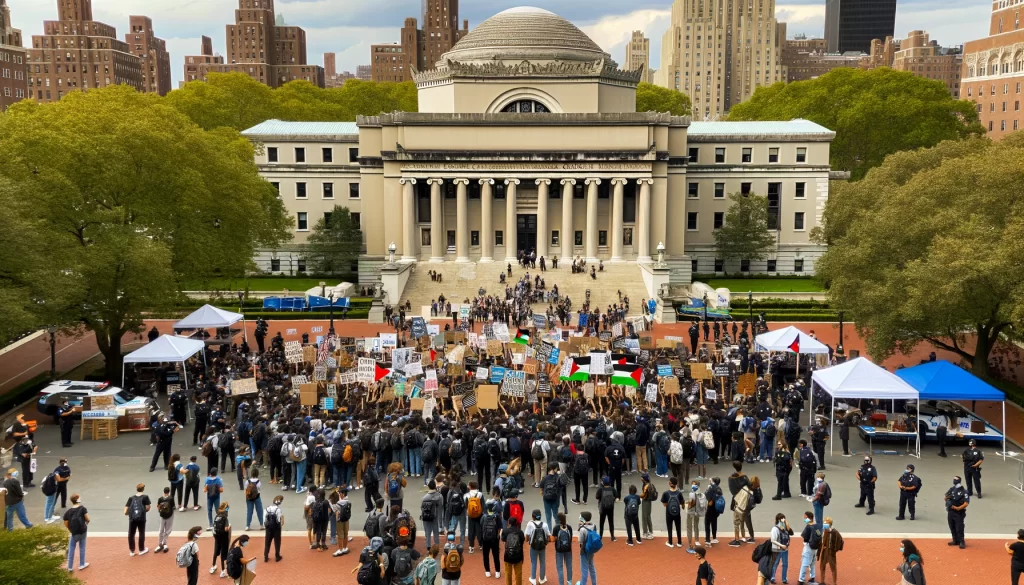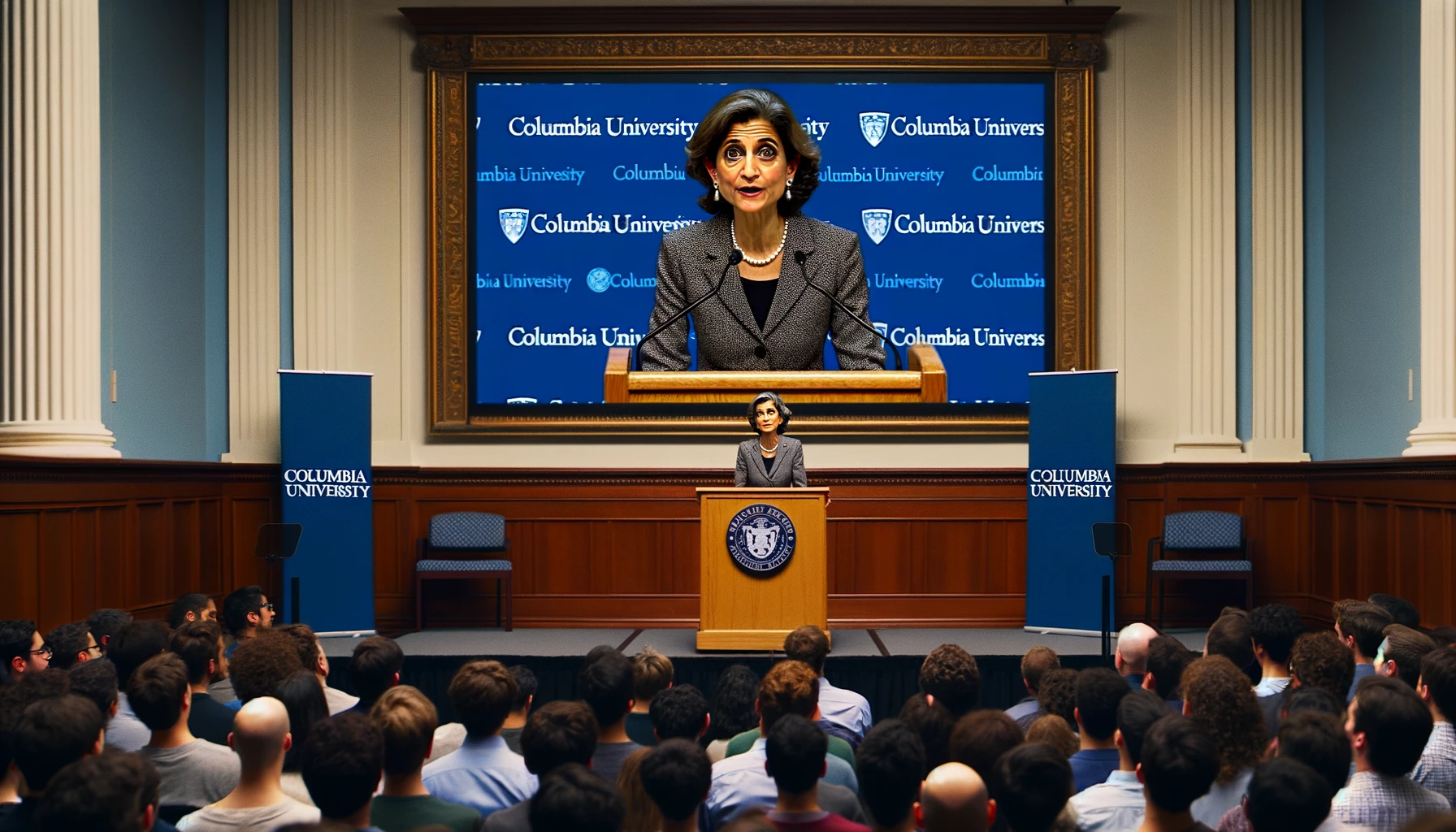On Thursday, the faculty of Arts and Sciences at Columbia University passed a vote of no confidence in the university’s president, Minouche Shafik. This decision reflects significant dissatisfaction with her handling of recent campus protests related to the Israel-Hamas conflict and her testimony before Congress on the matter. The faculty’s vote underscores deep concerns about Shafik’s leadership and its impact on the university’s core values.
Background of the Vote
The vote of no confidence was passed with 65% of the voting faculty members expressing no confidence in Shafik’s leadership. Out of approximately 900 eligible faculty members, 709 participated in the vote. The resolution was introduced by the Columbia chapter of the American Association of University Professors (AAUP), a professional faculty organization.
Reasons for the No Confidence Vote
The faculty’s concerns are multifaceted and center around several key actions taken by President Shafik:
- Police Involvement in Campus Protests: One of the primary issues cited by the faculty was Shafik’s decision to call the police to clear a pro-Palestinian student encampment on April 18. This action was taken despite the unanimous advice from the executive committee of the University Senate against involving law enforcement. The resulting police action led to the arrest of over 100 students and significantly heightened tensions on campus. The faculty resolution stated that Shafik had “falsely claimed” that the students posed a “clear and present danger to the substantial functioning of the university,” which the faculty argued was not the case.
- Congressional Testimony and Academic Freedom: Another major point of contention was Shafik’s testimony before a congressional committee on antisemitism on April 17. During this testimony, Shafik promised to discipline faculty members who had expressed views against Israel that were interpreted as antisemitic. The faculty saw this promise as a violation of academic freedom and shared governance, fundamental principles that underpin the university’s operations.
- Cancellation of the Commencement Ceremony: In light of the protests and security concerns, Shafik decided to cancel the university’s traditional commencement ceremony. Instead, the university opted for smaller, separate ceremonies for its various colleges. This decision was deeply unpopular among students and faculty, who viewed it as a failure to adequately address the campus unrest while respecting the significance of the graduation milestone.
- Ongoing Tensions and Campus Lockdown: Following the April protests, Shafik maintained a partial lockdown of the main campus for over two weeks, citing security concerns. This extended period of restricted access further fueled dissatisfaction among students and faculty. The faculty resolution criticized this approach as exacerbating tensions and undermining the university community’s sense of safety and freedom.

Impact on Campus Life
The controversy surrounding Shafik’s leadership has had significant repercussions for campus life at Columbia University. The decision to cancel the traditional commencement ceremony led to a series of smaller events, which were not without their own signs of protest. During these ceremonies, students expressed their discontent by wearing symbols such as black-and-white kaffiyehs and unfurling Palestinian flags. Some students even used their graduation speeches to call for action on related issues, such as a cease-fire in Gaza and the university’s divestment from companies working with Israel.
Outside of the ceremonies, a group of students and faculty circulated an open letter calling on Shafik to better enforce security on campus and expressing support for her efforts to crack down on protesters. This letter was signed by hundreds of people, including alumni, parents, and others with no direct ties to the university, highlighting the divided opinions within the Columbia community.
Reactions and Future Steps
The faculty’s vote of no confidence is intended to send a strong message to the university’s board of trustees, which has thus far supported Shafik. The resolution emphasizes the need to rebuild trust and reestablish the university’s core values, including free speech, the right to peaceful assembly, and shared governance. Faculty members view the vote as a first step toward addressing the underlying issues and finding a path forward.
In response to the vote, Shafik has continued to engage with various members of the university community, including faculty, administration, and trustees, as well as state and city leaders. Columbia spokesperson Ben Chang stated that Shafik “appreciates the efforts of those working alongside her on the long road ahead to heal our community”.
Shafik has also taken steps to address the concerns raised by the faculty and students. She has been holding private meetings with faculty and other Columbia community members to repair ties and find a way forward without resigning. In a conciliatory note published in the school newspaper, Shafik acknowledged the difficulties faced by the university community and expressed her commitment to working for the common good at Columbia.
This article is based on the following articles:

Background Information
The Israel-Hamas Conflict
The Israel-Hamas conflict is a long-standing and complex geopolitical issue that has roots dating back to the early 20th century.
- Historical Background: The conflict centers around the territorial and political disputes between Israelis and Palestinians. The creation of the state of Israel in 1948 led to several wars and ongoing tensions with the Palestinian population, many of whom were displaced and now live in Gaza and the West Bank.
- Hamas: Hamas is a Palestinian Islamist political and militant organization that governs the Gaza Strip. It has been involved in multiple armed conflicts with Israel, including the recent flare-up that has led to widespread violence and civilian casualties.
- Recent Events: The latest conflict, often referred to as the Gaza-Israel conflict, saw significant escalation in violence, leading to international outcry and widespread protests, including those on university campuses around the world.
Academic Freedom
Academic freedom is a foundational principle in higher education that ensures faculty and students can engage in intellectual debate and research without fear of censorship or retaliation.
- Definition: Academic freedom allows scholars to teach, conduct research, and publish their findings without undue interference from authorities or institutions.
- Importance: This principle is crucial for fostering an environment where new ideas can be explored and debated, contributing to the advancement of knowledge.
- Challenges: Academic freedom can sometimes come into conflict with political pressures or public opinion, particularly when controversial topics, such as the Israel-Hamas conflict, are involved.
University Governance
University governance refers to the structures and processes through which universities are managed and decisions are made.
- Key Components: Governance typically involves the board of trustees, the president, faculty senates, and various administrative offices.
- Shared Governance: This concept emphasizes the collaboration between faculty, administration, and sometimes students in decision-making processes. Shared governance is intended to ensure that different perspectives are considered and that decisions reflect the collective interests of the university community.
- Role of the President: The university president is the chief executive officer, responsible for the overall management of the institution, including academic, administrative, and financial affairs. The president must balance various interests and navigate complex issues to maintain the university’s mission and values.
Campus Protests
Campus protests are a common form of activism where students and sometimes faculty gather to express their views on social, political, or economic issues.
- Historical Context: University campuses have long been sites of protest, dating back to movements such as the Civil Rights Movement and anti-Vietnam War protests in the 1960s and 70s. These protests often serve as catalysts for broader social change.
- Nature of Protests: Protests can take many forms, including marches, sit-ins, and occupation of buildings. They are usually aimed at drawing attention to a cause and prompting action from university administration or external authorities.
- University Response: How a university responds to protests can significantly impact its relationship with students and faculty. Responses can range from support and dialogue to disciplinary actions and involvement of law enforcement.
The Vote of No Confidence
A vote of no confidence is a formal statement or resolution indicating that a person in a position of responsibility, such as a university president, is no longer deemed fit to hold that position.
- Purpose: This vote is typically symbolic, aiming to express significant discontent and urge corrective actions. It can lead to increased scrutiny and pressure on the individual to resign or change their policies.
- Process: The process usually involves a formal vote by a governing body, such as the faculty senate. A majority vote indicates a lack of confidence in the leader’s ability to effectively manage the institution.
The Current Situation at Columbia University
The vote of no confidence in President Minouche Shafik at Columbia University stemmed from her handling of pro-Palestinian protests on campus and her subsequent actions.
- Protests: Protests erupted on Columbia’s campus in response to the Israel-Hamas conflict, with students and faculty expressing support for Palestinian rights and criticizing Israeli policies.
- Police Involvement: Shafik’s decision to involve the police in dispersing protesters was highly controversial and viewed by many as an excessive use of force that violated students’ rights to peaceful assembly.
- Academic Freedom and Governance: Shafik’s pledge to discipline faculty who expressed anti-Israel views during her congressional testimony was seen as an infringement on academic freedom and shared governance, further fueling discontent among faculty and students.

Debate/Essay Questions
- Was President Minouche Shafik’s decision to call the police to clear the pro-Palestinian student encampment justified given the security concerns?
- How can universities balance the principles of academic freedom with the need to address allegations of antisemitism or other forms of hate speech?
Please subscribe to Insight Fortnight, our biweekly newsletter!
